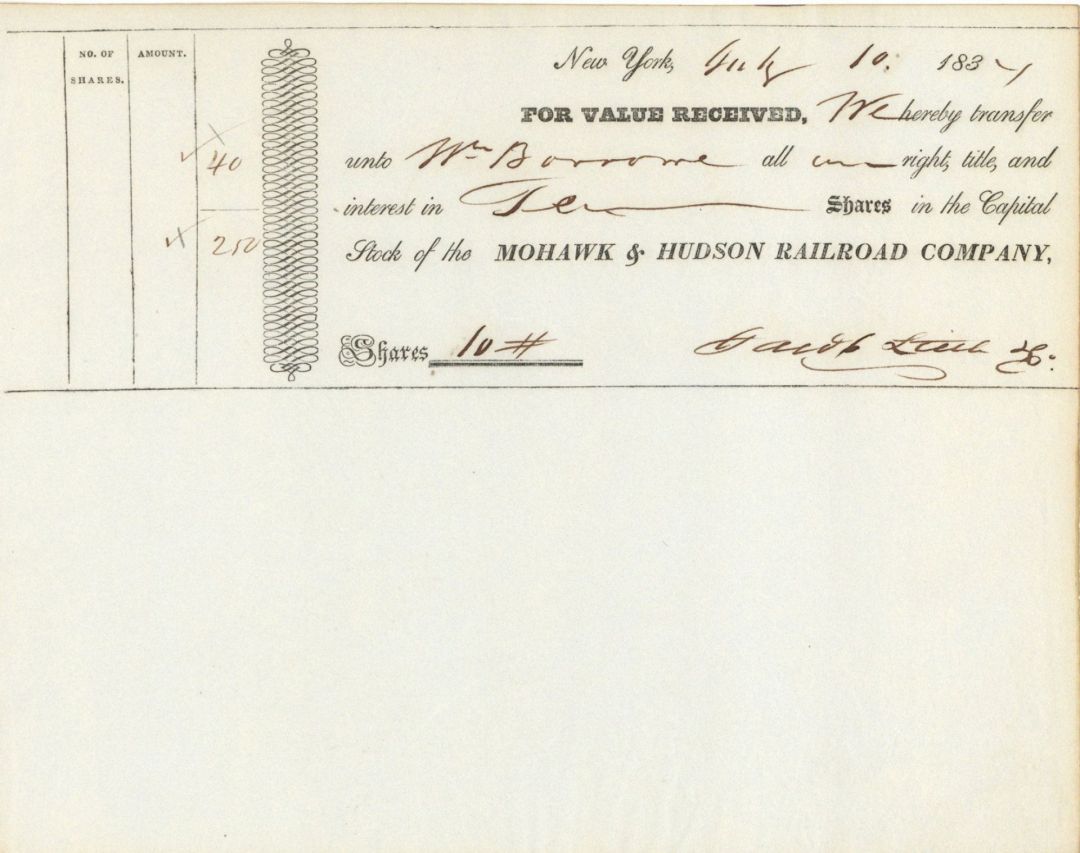Jacob Little Signed Mohawk and Hudson Railroad Co. - Autographs
Inv# AU1721 AutographJacob Little signed transfer. He was one of the old members of the Stock Exchange during the Era of “fogyism” in the street. He made and lost nine fortunes using speculative methods. One famous venture involved option selling of large blocks of Erie Railroad stocks to manipulate the market. The Erie Board formed a pool to “corner” Little in an attempt to ruin him. One hour before the options expiration, Little exchanged Erie Bonds and triumphed. His convertible bond trick led to the sixty day option rule.

Jacob Little originated the daring, dashing style of business in stocks, by which fortunes are made and lost in a day. He was born in Newburyport, Mass., and early exhibited great tact and aptitude for business. In 1817 he came to N.Y., and entered the store of Jacob Barker, who was at that time the most shrewd and talented merchant in the city. He remained with his master 5 years, and completed his financial education. In 1822 he opened an office in a small basement on Wall Street. Caution, self-reliance, integrity, and far-sightedness beyond his years, marked his early career. His ambition was to hold the foremost place in Wall Street. Eighteen hours a day he devoted to business. His evenings he spent in visiting retail houses to purchase uncurrent money. He opened a correspondence with leading bankers in all the principal cities from N.Y. to New Orleans.
Twelve years of industry, integrity, and energetic devotion to business placed Mr. Little at the head of financial operations on Wall Street. He identified himself with the style of business known as " Bearing Stocks." He was called the Great Bear on 'change. His mode of business enabled him to roll up an almost untold fortune. He held on to his system till it hurled him down and beat him to pieces. For more than a quarter of a century Mr. Little's office in the old Exchange building was the centre of daring, gigantic speculations. On change his tread was that of a king. He was rapid and prompt in his dealings, and his purchases were usually made with great judgment. He controlled so large an amount of stock that he was called the Napoleon of the Board. When capitalists regarded railroads with distrust, he put himself at the head of the railroad movement. He comprehended the profit to be derived from their construction. In this way he rolled up an immense fortune, and was known everywhere as the Railway King. He was the first-to discover when the business was overdone, and immediately changed his course. At this time the Erie was a favorite stock, and was selling at par. Mr. Little contracted to sell a large amount of this stock, to be delivered at a future day. His rivals on Wall Street, anxious to floor him, formed a combination. They took all the contracts he offered, bought up all the new stock, and placed everything out of Mr. Little's reach, making it, as they thought, impossible for him to carry out his contracts. His ruin seemed inevitable, as his rivals had both his contract and the stock. The morning dawned when the stock must be delivered, or the Great Bear of Wall Street break. At one o'clock he entered the office of the Erie company. He presented certain certificates of indebtedness which had been issued by the corporation. By those certificates the company had covenanted to issue stock in exchange. That stock Mr. Little demanded. Nothing could be done but to comply. With that stock he met his contract, floored the conspirators, and triumphed.
Walking from Wall Street with a friend one day they passed through Union Square, then the abode of our wealthiest people. Looking at the rows of elegant houses, Mr. Little remarked, "I have lost money enough today to buy this whole square. Yes," he added, "and half the people in it." Three times he became bankrupt. In each failure he recovered, and paid his contracts in full. It was a common remark among the capitalists, that " Jacob Little's suspended papers were better than the checks of most men." His personal appearance was commanding. He was tall and slim; his eye expressive; his face indicated talent; the whole man inspired confidence. He was retiring in his manner, and quite diffident except in business. He was generous as a creditor. If a man could not meet his contracts,











Ebay ID: labarre_galleries